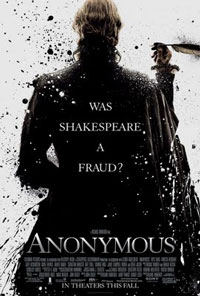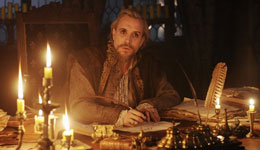Did William Shakespeare write the plays and collected works attributed to him or is someone else responsible? In an age where conspiracy theories are more popular than reality-TV shows, director Roland Emmerich and writerJohn Orloff not only ask, but offer an answer that question.
 Anonymous follows the train of thought that Elizabethan aristocrat Edward de Vere, 17th Earl of Oxford (Rhys Ifans), is the real author to Shakespeare’s works. Shakespeare (Rafe Spall) himself? Well, if you buy into this version, he was an uneducated dullard and bumbling actor with barely enough brains to take credit for another’s work.
Anonymous follows the train of thought that Elizabethan aristocrat Edward de Vere, 17th Earl of Oxford (Rhys Ifans), is the real author to Shakespeare’s works. Shakespeare (Rafe Spall) himself? Well, if you buy into this version, he was an uneducated dullard and bumbling actor with barely enough brains to take credit for another’s work.
Emmerich and Orloff aren’t the first to raise the question of Shakespeare’s authorship, but the case they make here involving vast conspiracies, secrets of the royal family, and a super-secret plan of succession to the throne of England come off more like bad soap opera than tragic drama. Their attempt to devalue Shakespeare further by portraying him as a angry buffoon don’t help their argument.
The choice to tear down Shakespeare to help build up Edward simply doesn’t work, and if the case for Edward was strong enough on its own it wouldn’t be necessary. The mean-spirited tone of script feels like it’s coming from a position of a person with an axe to grind rather than a historian searching for the truth or offering a alternative theory of events. The script’s version of Shakespeare as a caricature who would be lucky not to shit himself in public would only have been less subtle had they cast Kevin James in the role. I take that back; James would have given a more nuanced performance.
 The historical intrigue centers around an ailing Elisabeth I (Vanessa Redgrave) and the uncertainty of succession after her death. Her advisers William (David Thewlis) and Robert Cecil (Edward Hogg) strongly push for James VI of Scotland (James Clyde) as it would continue their good fortune under the crown. However, the story tells us, Elizabeth has another heir who could make a claim on the crown.
The historical intrigue centers around an ailing Elisabeth I (Vanessa Redgrave) and the uncertainty of succession after her death. Her advisers William (David Thewlis) and Robert Cecil (Edward Hogg) strongly push for James VI of Scotland (James Clyde) as it would continue their good fortune under the crown. However, the story tells us, Elizabeth has another heir who could make a claim on the crown.
As Edward isn’t able to publish his own works (for reasons that are addressed but never thoroughly explained) he offers a young playright, Ben Johnson (Sebastian Armesto), the opportunity to present the plays as his own. When Johnson balks at the offer, it’s a dimwitted actor named Shakespeare who seizes his chance.
The script is a mishmash of political intrigue under Elizabeth and the secret life of Edward as the nation’s great playwright. The film has little trouble modifying history to its own ends including muddying up Edward’s lineage (and that of his progeny) and downplaying the Essex Rebellion as nothing more than an attempt to get the ear of the Queen. It also gives Edward credit for all of Shakespeare’s work as well as the future success of Johnson who, as the script believes, only became a real writer once he was touched by Edward’s genius.
 Although the film does a fair job with keeping suspense throughout the proceedings and offering some argument for Edward’s claim as the real writer behind Shakespeare’s plays (that fact that many of his works have some resemblance to Edward’s life), the entire enterprise never feels as serious as it wants us to take it. It doesn’t help every time the script introduces another famous Elizabethan, I bemoaned the fact that I’d much rather be watching Shakespeare in Love.
Although the film does a fair job with keeping suspense throughout the proceedings and offering some argument for Edward’s claim as the real writer behind Shakespeare’s plays (that fact that many of his works have some resemblance to Edward’s life), the entire enterprise never feels as serious as it wants us to take it. It doesn’t help every time the script introduces another famous Elizabethan, I bemoaned the fact that I’d much rather be watching Shakespeare in Love.
Compared to other historical dramas, the look of the film works well enough but isn’t all that impressive. Although it’s competently done, it’s obvious Emmerich is working outside his element (which, as we all know, usually involves a worldwide threat). In much the same way the acting moves the plot along, but is hardly memorable. The film’s biggest failing isn’t that it’s awful. It works fairly well on some levels. No, the biggest failing is how forgettable and easy to dismiss a film entitled Anonymous turns out to be.
If the point of Anonymous was to raise an alternative explanation for the mind behind William Shakespeare’s work and begin a frank and honest discussion on the subject, it fails. Miserably. The film comes off far more like an attempt to dig into dirty politics while lecturing the audience on how stupid they, and everybody else (except those involved in this film), have been all these years, If that was why the film was created then, and only then, might you call it a success.







Comments on this entry are closed.